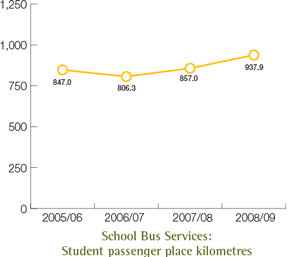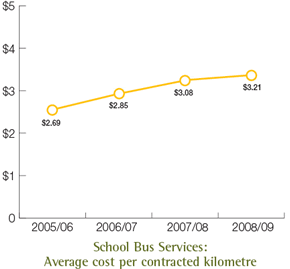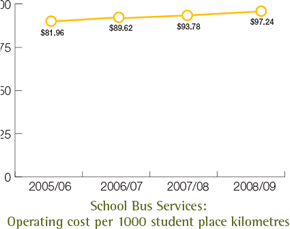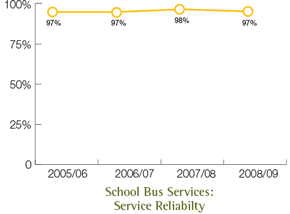School Bus Services
The PTA manages the policy and entitlement framework, system and contract management of more than 800 “orange”school buses around the State. These buses provide access to school for students in rural areas, picking them up from the farm gate (where appropriate), as well as providing access to schools in metropolitan areas for students attending special education facilities. Responsibility for the management of these services rests with the School Bus Services (SBS) branch within the PTA’s Transperth System, Regional and School Bus Services division.
In 2008/09, the school bus network comprised 703 school buses servicing mainstream schools, 118 school buses servicing special education facilities, and three regular public transport service arrangements.
These services were accessed by 25,300 students each school day around the State, using mainly the contracted orange school buses. Alternatively, where eligible students could not be accommodated on a school bus, their parents/carers were paid a conveyance allowance to help meet some of the costs incurred in getting their children to the nearest appropriate school.
|
OBJECTIVE |
OUTCOME |
|---|---|
|
Provide transport assistance for eligible students to help them attend their nearest government or non-government school offering the appropriate year of study. |
Currently operating 821 orange school bus contracts or paying a conveyance allowance to entitled students at a total cost of $87.1 million (includes seat belt fitment project). |
|
Ensure the transport assistance provided to students is appropriate, cost-effective, safe and fair in its application. |
Maintained the currency of Government policy on rural student transport assistance and increase its transparency (e.g. website access). Continued to manage the introduction of seat belts on government-funded school buses. Conducted two safety inspections on every school bus in the fleet during the year. |
|
Ensure that all service contracts are managed effectively and efficiently in accordance with agreements made between the Minister, the PTA and individual contractors and/or their representatives. |
Reviewed special education bus routes in metropolitan Perth and regional towns. Reviewed school bus routes that serve the fringes of metropolitan Perth. |
Cost of the service
The cost of providing 850 school bus services (inclusive of the gradual seat belt roll-out), payment of student fare concessions, and the payment of conveyance allowance was $87.1 million in 2008/09. The inclusion of administration and corporate on-costs meant total costs for SBS were $96.2 million in 2008/09.
All orange school buses are operated by private contractors. Four contract/service models were used in 2008/09 to provide student transport support:
- Composite Rate Model (CRM) contracts (20-30 years in duration) - 692 contracts
- Fixed-term contracts (tendered over 1-15 years since 1995) - 128 contracts
- Bunbury Regional School Bus cluster contract - one contract, multiple buses
- Regular passenger transport (licence arrangement with fare subsidy) - three arrangements
The CRM is an average cost model which was implemented in January 2004 and provides for contractor payments, with the cost elements of the payment model being reviewed over a three-year cycle by an independent review panel.
The Bunbury Regional School Bus cluster contract, previously operating under a licensing arrangement in Bunbury, has been replaced by a fixed-term contract.
Description of services
In 2008/09, student passenger place kilometres rose by 9.4 per cent due to:
- an increase in the number of orange contract school bus services from 810 in 2007/08 to 821.
- the inclusion of the Bunbury Regional School Bus cluster contract.
- an increase in the number of school days in the year to 196, and the subsequent increase in passenger service kilometres.
The service reliability measure covers rural mainstream services and education support school buses. The reliability measure is for the bus to arrive at school at least 10 minutes before school starts, and leave less than 10 minutes after school finishes.
In 2008/09, service reliability was 97 per cent, marginally lower than the previous year.
The year’s developments
At the beginning of the 2009 school year, as a result of extensive community consultation, seven school buses were introduced to transport slightly more than 300 eligible students from the Bindoon, Gingin, Lower Chittering, Muchea and Bullsbrook areas to a variety of private schools in the Ellenbrook, Middle Swan and Midland areas. An interim service network was provided for the 2009 school year while the extent of student uptake was evaluated. Once this is completed, long-term services will be tendered for 2010.
In addition to the realignment of three Dongara services in 2008, an interim service was implemented at the beginning of the 2009 school year to cater for an increased number of eligible students seeking transport assistance from the Eradu and Moonyoonooka areas. Further community consultation is due to take place during the second half of 2009 and the first half of the 2010 school year to finalise the review and to provide a long-term transport solution for this area.
Moorine Rock school bus routes were reviewed during 2009. Due to an unexpected population surge in the area, an additional service is due to commence at the beginning of the 2010 school year.
A review of services to Serpentine Jarrahdale Grammar School was conducted in 2009, and as a result it is expected that an additional service will commence in 2010.
Additional school bus services were commenced to Menzies, South Headland, Roebourne and Kununurra.
School bus services from the areas surrounding Bunbury, which transport students to Bunbury schools, were reviewed to improve service delivery and minimise the number of bus transfers for students. As a result, there were an additional three services at the start of the school year.
Progress continued on the project - managed by the PTA - to fit seat belts on all Government-funded school buses by December 2015. Through normal bus replacement (replacement within a CRM contract or re-tendering of a fixed term contract), 96 new buses with seatbelts entered the fleet during the year. An additional 19 new services were provided with seat-belted seats.
At the end of 2008/09 there were 374 school buses (45.6 per cent of the contracted fleet) fitted with seat belts.
Major initiatives for 2009/10
Continue to review and, where required, introduce efficiency rationalisation of school bus routes as follows:
- Review of school bus services operating in the Perth metropolitan fringe e.g. City of Wanneroo
- Review rural school bus services operating in Hyden, Kojonup, Binningup, Donnybrook, Toodyay, north and east of Geraldton, Capel to Bunbury, and east of Merredin
- Finalise a new service contract for the Department of Education and Training (DET) funded transport assistance for Aboriginal Education Colleges
- Continue liaison with the DET to review the student transport assistance policy with regard to the review of transport provision when school facilities are opened or closed.



